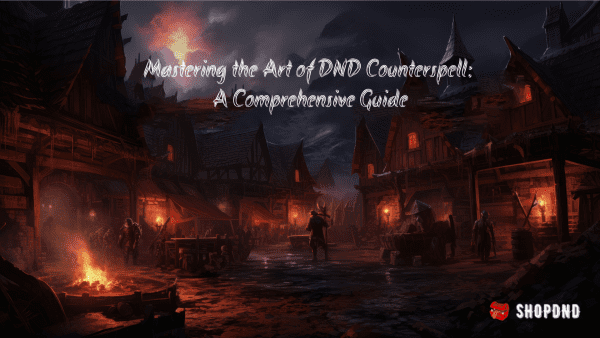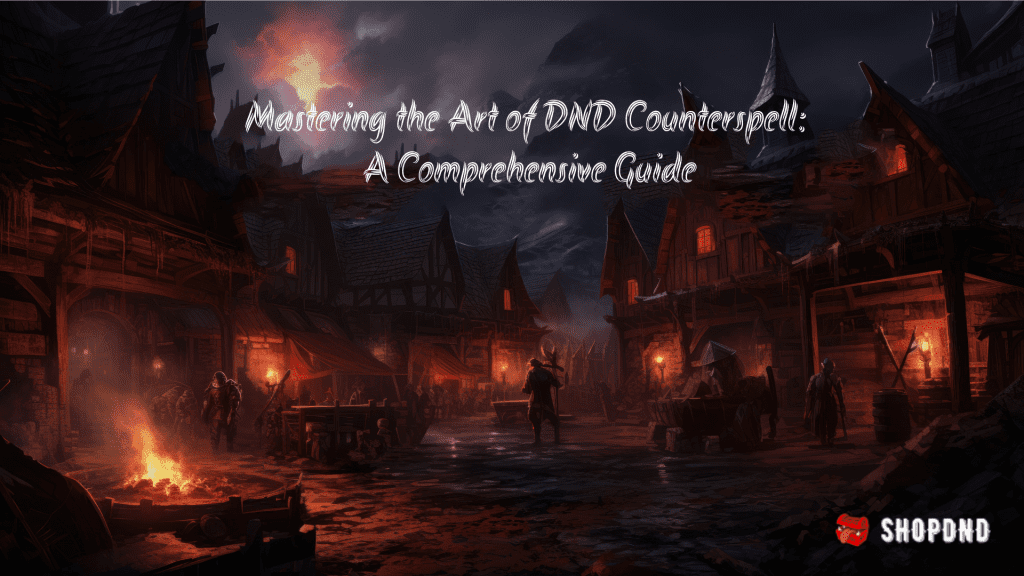
Mastering the Art of DND Counterspell: A Comprehensive Guide
DND Counterspell is a 3rd-level abjuration spell that every aspiring wizard, sorcerer, or spellcaster should have in their magical repertoire. It allows you to interrupt and negate the effects of spells cast by others, providing a crucial defence against enemy spellcasters. DND Counterspell can turn the tide of battle in your favour by preventing your adversaries from unleashing devastating magic upon you and your party.
However, using DND Counterspell effectively requires more than just knowledge of its mechanics; it demands a deep understanding of timing, strategy, and teamwork. In this guide, we will explore the fundamental principles of Counterspell, delve into advanced strategies, provide practical tips, and answer frequently asked questions. By the end, you'll be well-prepared to harness the power of DND Counterspell in your DND adventures.
01 The Basics of DND Counterspell
Before diving into advanced strategies, it's essential to grasp the basics of DND Counterspell. Understanding its mechanics lays the foundation for effective spell interruption. Let's explore the essential components and rules:
Components and Range
Components
DND Counterspell requires verbal and somatic components, making it relatively easy to cast in the midst of a heated battle. Verbal components involve chanting incantations, while somatic components require specific gestures. These components reflect the quick and decisive nature of Counterspell.
Range
DND Counterspell has a range of 60 feet, allowing you to counter spells from a safe distance. This range is crucial for staying out of the immediate danger posed by enemy spellcasters while still exerting your magical influence.
Spell Level Matters
The effectiveness of DND Counterspell depends on the level of the spell you're attempting to counter. To successfully counter a spell, you must roll a twenty-sided die (a d20) and add your spellcasting ability modifier to the result. The DC for this ability check equals 10 plus the level of the spell being countered. Here's a reference for the DC values based on spell level:
- 3rd-level Spell: DC 13
- 4th-level Spell: DC 14
- 5th-level Spell: DC 15
- And so on for higher-level spells.
Higher-Level Casting
To enhance your chances of countering spells effectively, you can cast DND Counterspell using a spell slot of a higher level than 3rd. For each level above 3rd, you gain a +1 bonus to your ability check, increasing your likelihood of countering higher-level spells. This flexibility empowers you to tackle even the most formidable magical threats.
02 Advanced Strategies for Counterspelling
Now that you have a solid understanding of the basics, let's delve into advanced strategies to further refine your Counterspelling skills. These strategies will help you become a true master of the art:
Spell Identification
One of the key aspects of successful Counterspelling is identifying the spell being cast by your opponent. Pay close attention to the verbal and somatic components, as well as the spell's effects. Being able to recognise spells quickly can give you a significant advantage.
When your opponent begins casting a spell, describe what you see and hear to your Dungeon Master (DM). If you can pinpoint the spell's identity, you can make an informed decision about whether to counter it or save your Counterspell for a more significant threat.
Timing Is Everything
Counterspelling requires precise timing. You must declare your intention to counter a spell as soon as it's cast, but before the DM announces its effects. This timing window is crucial, and a well-timed DND Counterspell can foil your enemy's plans.
Keep in mind that you won't know the level of the spell your opponent is casting until you decide to Counterspell it. To maximise your chances of success, communicate with your DM and fellow players to establish a clear sequence of events during spellcasting.
Communicate with Your Party
Effective teamwork is vital in Dungeons & Dragons, and Counterspell is no exception. Coordinate with your fellow adventurers to ensure that DND Counterspell is used strategically. Knowing when to save your spell slots and when to unleash Counterspell can make a world of difference.
For example, if your party faces a formidable spellcaster, such as an enemy wizard, consider designating one spellcaster as the primary Counterspeller. This player can focus on Counterspelling while the others concentrate on offence or support. Clear communication and teamwork can lead to more successful Counterspells and a stronger party overall.
Countering Counterspell
Beware of opponents who also have DND Counterspell at their disposal. If your spell is countered, you can attempt to Counterspell their Counterspell, creating a spellcasting showdown. Be prepared for this possibility and have a backup plan in case things don't go your way.
Maintain awareness of your spell slots and use them judiciously. A well-timed Counterspell to negate your opponent's Counterspell can save a crucial spell slot for a more pressing situation. Consider discussing Counterspell tactics with your party to ensure everyone is on the same page when facing enemy spellcasters.
03 Frequently Asked Questions
To further enhance your understanding of Counterspell, let's address some frequently asked questions:
1. Can Counterspell be used against any spell?
DND Counterspell can be used against any spell of 3rd level or lower, as long as the caster successfully meets the ability check DC. However, it cannot counter spells cast as rituals or innate spellcasting abilities.
2. Can I increase my chances of success when Counterspelling higher-level spells?
Yes, by using a higher-level spell slot, you gain a bonus to your ability check, increasing your chances of countering higher-level spells. This flexibility makes DND Counterspell a versatile tool against a wide range of magical threats.
3. Is there a limit to how many times I can use Counterspell?
As long as you have spell slots available, you can use DND Counterspell multiple times during an encounter. Keep track of your remaining spell slots to ensure you can respond to ongoing magical threats.
4. Can Counterspell be used against innate spellcasting abilities of creatures?
DND Counterspell can be used against innate spellcasting abilities, provided they are cast as spells and not considered supernatural abilities. Be attentive to the description of the creature's abilities to determine if Counterspell is applicable.
03 Conclusion
Mastering DND Counterspell is an art that can significantly enhance your effectiveness as a spellcaster in the world of Dungeons & Dragons. By understanding the basics, employing advanced strategies, and coordinating with your party, you can become a true master of this powerful spell.
At ShopDnD, we're passionate about all things DND, including the intricacies of spellcasting. If you're ready to embark on a magical adventure, don't forget to visit our store for a wide range of DND-themed clothing. For more information about our store, size guide, and delivery info, feel free to contact us or connect with us on social media platforms like Facebook, TikTok and Instagram.


